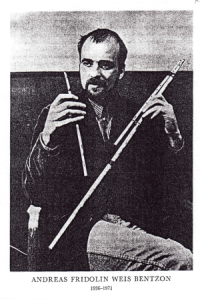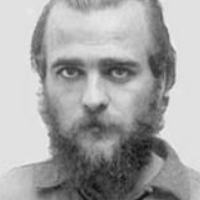A.F.W.BENTZON |
||||||||
|
An eclectic researcher
He would eventually dig and enhance every seam of that rich, inaccessible gold mine: the sociological features, between religion and paganism, the anthropological ones, through his direct close contact with the people in their villages, his research, his recording of unwritten folk tales, Sardinian language poems and traditional music. Of the many foreign researchers who visited the island in the last two centuries, Andreas Fridolin Weis Bentzon � whose life was too short - was perhaps the most eclectic. Working on its folk roots, he was able to highlight many of the peculiar high contents of Sardinian culture. When he arrived on the island, in the 1950s, Sardinia was still suffering from the devastating cultural crisis that started in the 1920s, when any music, dance and poetry events were forbidden, and continued after the war, with the impact of mass communication and the invasion of outside cultures. In addition to this crisis, the world of launeddas also felt the impact of mechanical music players, substituting the players and their records, and the ridiculous Authors' Right charge demanded by the obrerìas � organizing committees for folk dances and festivities � that increasingly reduced the number of yearly contracts for players. In those years, Bentzon's arrival had almost a healing effect: his sharpness, his ability to manage situations rendered difficult by his hosts' initial diffidence, and the respect he had for his �informers' and their art, enabled him to earn everybody's appreciation. He was thus able to record every little detail of his friends' knowledge in his interminable series of notes, transcripts, sound recordings, photos and films. Dante Olianas � from the Preface to the Italian edition of "Launeddas - A.F.W.Bentzon" Article by Anthropology Professor Johannes Nicolaisen
|
|||||||
 |
FOLK DANSK ETNOGRAFISK TIDSSKRIFT Johannes Nicolaisen [ ... ] Personally and scientifically Fridolin was an individualist possessing unusual qualifications. His anthroporogical interest was deep and genuine, and also extensive and without any prejudice concerning methods or schools, the relative importance of which he always tried to view in an objective way. His interests also surpassed the proper anthropological scope and included types of philosophy as well as general theory of science. |
|
|
|
Copyright
© 2002 / 2019 Associazione Iscandula - Via Perda Bona, 6 - 09045
Quartu Sant'Elena (CA) P.IVA 01878590924 - Cell phone +39 348 2256594 - siscandula@tiscali.it |


